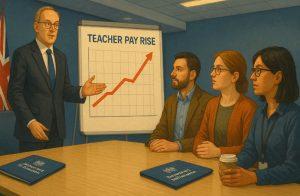In a profession where dedication often outweighs compensation, discussions around teacher pay are more than just numbers—they reflect the value placed on education itself. As 2025 unfolds, the question on every UK educator’s mind is clear: Will this year finally deliver a meaningful pay rise that meets both professional and economic realities?
With inflation still influencing household budgets and recruitment challenges persisting across schools, the government’s proposals for the 2025 teacher pay increase carry significant weight. Educators, policymakers, and union leaders alike are watching closely as new salary frameworks and funding models emerge, aiming to balance fairness, retention, and fiscal responsibility.
This article explores what teachers in London and across the UK can realistically expect from the 2025 pay adjustments, and what it all means for the future of the profession.
What Is the Expected Teacher Pay Rise in the UK for 2025?

The teacher pay rise for 2025 is one of the most anticipated announcements in the education sector. Following years of real-terms salary decline due to inflation and stagnating pay scales, the Department for Education (DfE) and the Treasury are now proposing an average increase of 6% to 6.5% across various teaching roles.
This announcement aligns with broader public sector pay reforms, driven by pressure from unions, cost of living increases, and the need to address the teacher recruitment and retention crisis. The proposed rise builds on the previous 2024 uplift that saw entry-level teachers’ salaries reach £30,000 nationally.
How Will the Pay Rise Impact London Teachers Specifically?
Inner vs Outer London Salary Variance
Teachers in London typically receive additional pay through the London weighting allowance, which varies depending on whether the school is located in Inner, Outer, or Fringe London.
For 2025, the proposed uplift includes maintaining this allowance structure, with new starting salaries projected to be:
| Location | 2024 Starting Salary | 2025 Projected Salary | % Increase |
| National (outside London) | £30,000 | £32,000 | 6.7% |
| Outer London | £33,000 | £35,200 | 6.7% |
| Inner London | £36,745 | £39,150 | 6.5% |
This increase attempts to better reflect the higher cost of living in the capital and to help London schools attract and retain qualified staff.
What Are the Department for Education’s Plans for Salary Bands in 2025?
Main Pay Range (MPR) and Upper Pay Range (UPR)
The DfE has proposed the following pay band adjustments:
| Pay Scale | 2024 Salary Range | 2025 Projected Range |
| MPR (England) | £30,000 – £41,333 | £32,000 – £44,150 |
| UPR (England) | £43,685 – £46,274 | £46,500 – £49,200 |
These figures are part of efforts to ensure fair career progression and to reward experience and performance over time.
Leadership Group and Headteacher Salaries
Leadership positions are also expected to see significant boosts, particularly in areas facing headteacher shortages.
Will the Teacher Pay Increase Keep Up with Inflation and the Cost of Living?

The Office for National Statistics (ONS) estimates that UK inflation will remain between 4% and 5% in 2025. While the proposed teacher pay rise exceeds this projection nominally, many argue that it merely restores previous purchasing power eroded over a decade of below-inflation adjustments. Similar discussions are unfolding across the NHS workforce, where inflation-adjusted wages are also under scrutiny. You can read more here: NHS Pay Rise 2025
Real-Terms Salary Comparison
| Year | Average Teacher Salary | Inflation Rate | Real-Terms Value |
| 2020 | £38,000 | 0.9% | £37,659 |
| 2024 | £42,500 | 7.3% | £39,471 |
| 2025 (projected) | £45,500 | 4.2% | £43,658 |
Despite the rise, teachers are still behind pre-2010 pay levels when adjusted for inflation.
How Are Teaching Unions Responding to the 2025 Pay Proposals?
National Education Union (NEU) and Other Bodies
The NEU, NASUWT, and other teaching unions have cautiously welcomed the proposed pay rises but have stated they fall short of full real-terms restoration.
- NEU leaders argue that a 10% uplift is necessary to truly stabilise the profession.
- Unions are closely watching budget allocations to ensure schools can afford to implement the rises without cutting staff or resources.
Strike Action and Ballots
Although strike actions were paused after the 2024 settlement, unions retain the right to strike should funding not be secured.
What Role Does the Teachers’ Pay Review Body Play in 2025 Salary Decisions?
The Teachers’ Pay Review Body (TPRB) is an independent advisory board that analyses education sector data, union recommendations, and government funding limits to produce annual pay suggestions.
TPRB Process in 2025
- Submissions from stakeholders were collected in early 2025.
- A final report was issued to the Secretary of State for Education in April.
- The government is expected to issue a formal response and implementation plan by July 2025.
The government usually accepts most TPRB recommendations, although budget limitations may lead to partial adoption.
What Will Be the Starting Salary for New Teachers in 2025?

National and Regional Entry Pay
As part of its commitment to raise the teaching profile, the government pledged in 2022 to ensure that all new teachers earn at least £30,000. The 2025 rise now pushes this to:
- £32,000 in England outside London
- £35,200 in Outer London
- £39,150 in Inner London
This remains competitive when compared to other public sector entry roles.
How Does the UK Teacher Pay Rise Compare Internationally in 2025?
According to the latest OECD “Education at a Glance” report, UK teacher salaries are:
- Mid-range among EU countries
- Lower than countries like Germany and the Netherlands
- Comparable to France and Italy
The 2025 increases improve the UK’s position slightly, but critics say it still lags behind the European average for teachers with 15+ years of experience.
What Should Teachers Do Now to Prepare Financially for 2025?
Understanding Payslip Changes
Teachers should anticipate new tax code adjustments, updated pension contributions, and revised student loan repayment thresholds.
Financial Planning Steps
- Review updated salary bands through union portals or DfE resources.
- Adjust personal budgets to reflect any changes in take-home pay.
- Consider pension implications of increased earnings.
How Will the 2025 Pay Rise Affect Career Progression Opportunities for Teachers?

The 2025 salary uplift isn’t just about base pay. it’s also aimed at enhancing career satisfaction and long-term professional growth.
Promotion Incentives and New Leadership Opportunities
With expanded pay bands and clearer progression routes, more educators are likely to consider applying for middle and senior leadership roles. Schools are being encouraged to:
- Introduce specialist leadership posts (e.g. SEN leads, curriculum heads)
- Offer mentorship allowances for experienced teachers guiding early-career colleagues
- Use TLR (Teaching and Learning Responsibility) payments to reward subject leadership
Retention in Middle Leadership
Previously, the pay gap between classroom teachers and leadership roles was narrow, making promotion less attractive. The new framework widens this gap modestly, increasing the incentive to remain in the profession and progress internally.
What Challenges Might Schools Face in Implementing the 2025 Teacher Pay Rise?
While the pay rise is broadly welcomed, implementation could pose logistical and financial difficulties, especially for schools with tighter budgets.
Budget Constraints and Staffing Pressures
Many headteachers have expressed concern that the government’s additional funding may not be sufficient to cover the full costs. Key issues include:
- Schools may need to reallocate internal budgets, affecting resources and support staff hiring.
- Multi-academy trusts (MATs) will manage pay allocation differently, potentially leading to regional disparities.
- Some small schools may delay full implementation, causing morale issues among staff.
Workload and Expectations
There is a risk that pay rises will be accompanied by increased performance expectations, especially where local authorities or trusts demand more accountability.
What Does the Future Hold for Teacher Pay Beyond 2025?
Looking ahead, the education sector is calling for a long-term strategy rather than year-to-year adjustments.
Calls for a National Pay Reform Strategy
Education unions and policy think tanks are urging the government to:
- Introduce multi-year funding settlements for schools
- Tie teacher pay more closely to inflation and cost of living indexes
- Increase investment in CPD (Continuing Professional Development) as part of the reward system
Potential Policy Shifts
The next general election, expected in 2026, could bring new policies to the fore. Labour and Conservative education manifestos both indicate a greater emphasis on workforce retention, which may result in more predictable salary reviews and even decentralised pay structures.
How Are Academies and Free Schools Approaching the 2025 Pay Rise?

Academies and free schools in England have greater autonomy when it comes to staff pay, unlike maintained schools which must adhere to the School Teachers’ Pay and Conditions Document (STPCD). This flexibility can lead to both opportunities and inconsistencies.
Autonomy in Pay Structures
While many academies choose to follow national pay scales as a guideline, others opt for bespoke salary frameworks. In 2025, these schools are expected to:
- Match or exceed the proposed government increases to remain competitive in attracting talent.
- Offer performance-related bonuses or recruitment/retention allowances, especially in shortage subjects like maths, science, and computing.
- Develop individualised career pathways that offer faster progression through internal benchmarks.
However, this can also create inequity between schools in the same local area, leading to recruitment competition and staff movement across trusts.
Transparency and Accountability
With more focus on fair pay, there’s growing pressure for academies and free schools to publish clearer pay policies and demonstrate how they’re using public funds for staffing. The Education and Skills Funding Agency (ESFA) is expected to release updated compliance guidelines in late 2025.
What Do Students and Parents Think About the Teacher Pay Increase in 2025?
While most public discussion focuses on educators and policymakers, the opinions of students and parents the primary stakeholders in education are also essential.
Parental Support for Fair Pay
Surveys conducted by groups like Parentkind show overwhelming parental support for increased teacher pay. Key findings include:
- Over 70% of parents believe teachers deserve pay that reflects their qualifications and responsibilities.
- Concerns about disruption from strikes were significant in 2023 and 2024, but many parents acknowledged that industrial action was justified due to long-term underfunding.
Impact on Student Experience
For students, the benefits of a motivated and stable teaching staff are substantial. Improved teacher pay is expected to:
- Reduce staff turnover, providing more continuity in learning.
- Attract higher-calibre graduates to the profession, enriching the classroom environment.
- Support better pastoral care and extracurricular engagement, as teachers feel more valued and less overworked.
While not directly involved in policy decisions, the perspectives of families play a key role in shaping public opinion and influencing future government actions.
Conclusion
The 2025 teacher pay rise is a welcome move, offering long-overdue salary increases especially for London educators. While it signals progress, it doesn’t fully reverse years of stagnating real-terms wages. For lasting impact, this uplift must be supported by better funding, fair implementation, and broader reforms around workload and career development. It’s a step forward, but the journey to rebuild the profession continues.
What Are the FAQs About Teacher Pay in 2025?
When will the 2025 teacher pay rise be officially confirmed?
The government is expected to finalise and confirm the pay scale changes by July 2025 following the TPRB recommendations.
Are independent school teachers included in the 2025 pay rise?
No, independent schools are not legally required to follow DfE pay scales, but some may adopt similar uplifts.
Will part-time teachers receive the same pay increase?
Yes, part-time teachers receive a pro-rata pay increase based on the full-time equivalent (FTE) rate.
What funding measures are being put in place to support this rise?
The government has pledged additional funding through the Schools Block Grant, but concerns remain about sufficiency.
How does pension contribution affect take-home pay after the rise?
Higher salaries may increase pension contributions slightly, which could affect take-home pay despite the rise.
Are teaching assistants also included in the pay discussions?
Not directly, but some local authorities are reviewing TA pay rates in response to teacher pay scale adjustments.
Could pay increases affect recruitment and retention in 2025?
Yes, improved salaries could positively impact both recruitment and long-term teacher retention rates.









Leave feedback about this